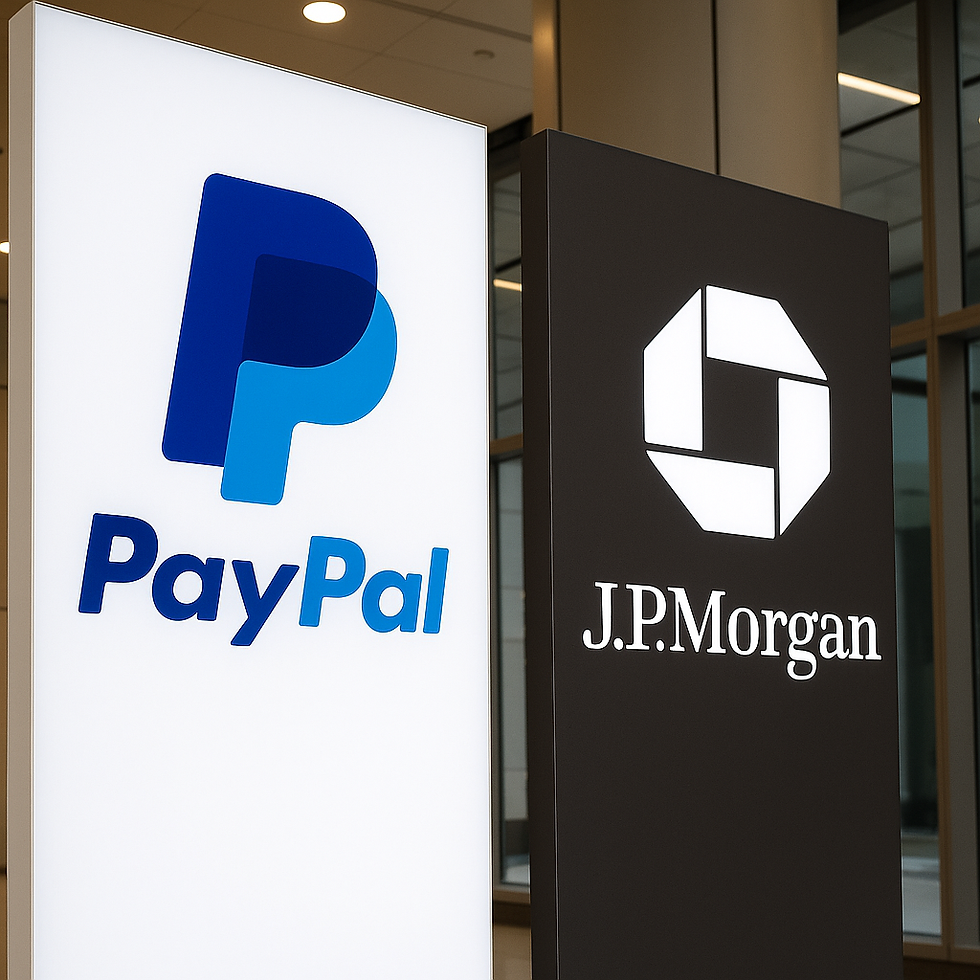Monday Roundup: Crypto Goes Mainstream While Open Banking Hits a Wall
- Staff Writer

- Jul 28, 2025
- 3 min read

PayPal Supercharges Crypto Payments for U.S. Merchants
PayPal is making bold moves this week, turbocharging the adoption of cryptocurrencies at checkout for U.S. merchants. The global payments giant has unveiled its "Pay with Crypto" feature, which enables businesses to accept over 100 digital currencies, including Bitcoin, Ethereum, Solana, and popular stablecoins, from customers using many of the world's leading crypto wallets, such as Coinbase, MetaMask, Binance, and Kraken.
Why does this matter?
PayPal is slashing the high cost and slow pace of cross-border payments.
For the first year, crypto transactions will carry a tiny 0.99% processing fee, a stark contrast to the 10% or higher rates businesses might pay for traditional international payments.
After the first year, the fee rises modestly to 1.5%. Merchants can also instantly convert received crypto to U.S. dollars or PayPal’s stablecoin (PYUSD), which pays out an attractive 4% yield if held within PayPal. For businesses, this means quicker settlement and greater profits from international shoppers. Imagine a customer in Guatemala seamlessly buying from a shop in Oklahoma City, with nearly instant, low-cost crypto payments now a reality.
This move signals not just PayPal’s renewed commitment to digital assets after cooling off during the last crypto winter, but also a continued mainstreaming of crypto payments for everyday commerce. With more than 650 million crypto users worldwide and a $3 trillion digital asset economy, PayPal’s new feature could be a major unlock for small businesses seeking global reach.
JPMorgan’s Data Fees Stir Up the Fintech Waters
While PayPal is opening up global commerce, the gatekeepers at JPMorgan are tightening their grip, sending shockwaves through the fintech ecosystem. JPMorgan has drawn a line in the sand, announcing striking new fees for fintech firms and data aggregators (think Plaid, MX, Yodlee, and others) who want access to customer bank data. Some of these fees could exceed hundreds of millions of dollars per year and may wipe out more than 75% of Plaid’s annual revenue.
JPMorgan says the move is about cost recovery and consumer protection, pointing to the nearly 2 billion account data requests per month that now flow through its systems, much of them, it claims, without direct consumer action. The bank highlights its $18 billion annual tech budget and increasing fraud risk as justification, suggesting that uncontrolled data harvesting is exposing customers to real financial harm.
But fintechs argue this threatens the heart of open banking. For years, apps like Robinhood, Cash App, and Rocket Money have been built atop access to consumer-permissioned data, making budgeting, investing, and payments easier for tens of millions of users. By hiking the cost, JPMorgan could choke off smaller competitors and hand more power to the giants.
The timing is fraught: the Consumer Financial Protection Bureau (CFPB) is close to finalizing new rules meant to secure people’s access to their own financial data. Many see JPMorgan’s move as an attempt to undercut those reforms and cement control over the digital rails of American banking.
Both stories mark pivotal moments for the future of fintech. On the one hand, PayPal is democratizing access to global digital payments. On the other, JPMorgan’s approach risks narrowing consumer choice and hiking costs for millions. This tug of war, between platforms opening doors and incumbents drawing lines, will shape the financial lives of customers and businesses for years to come.





Comments